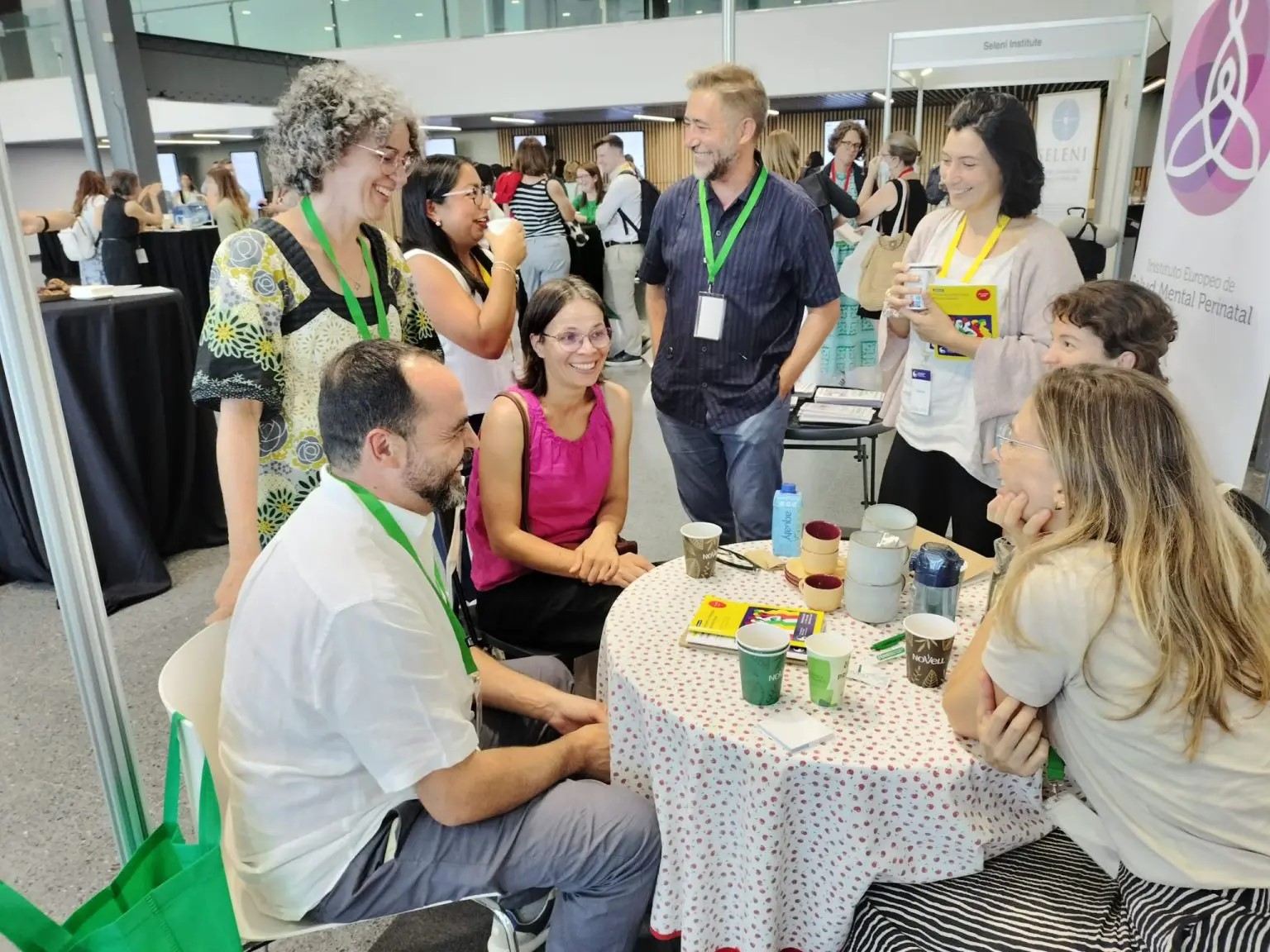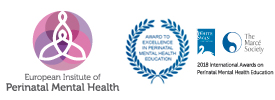
By Javier de Domingo, perinatal psychologist, attended Marce Society International conference in Barcelona.
I dare say that those of us who work in perinatal health, feel a deep call to do so. It is very likely that our work speaks as much about us as it does about the mothers and fathers we walk with. Maybe, hidden somewhere in our body are the wounds that have marked us, of what should “be” but was not. Perhaps that’s where our impulse to revisit the perinatal scenarios that we try to promote, avoid or repair in our patients again and again comes from. Perhaps our looped efforts are less altruistic than we think. Maybe not.
A wonderful patient, after losing his baby, told me:
“On this therapeutic path that I have started, I have learned that you have to ask for what you need, whether it is love, attention or care. But where is the generosity of giving? What should you expect from others when the world is crashing on you?”
“Wow” I thought.
I felt the enormous pain of someone who asks for help and does not find it to his measure. His world was collapsing. One grief can activate a previous one, lurking in the depths of past traumas. I knew clearly that I was facing one of those key moments in the therapeutic process. My next words were important. I couldn’t fail him as those who previously had the task of building the meaning of “asking” and “establishing trust” for him had done before. I perceived the wounded child who expressed himself through his grieving adult and I had to attend to both, reaching out to the first and appealing to the second.
My answer is a private matter between us, although I had to differentiate between giving, receiving, from where and why. At least, I think it helped to strengthen his confidence in the therapeutic bond and to hold on at least one more week until the next session. Where do therapists prepare to accompany something as precise as the grief of a father who loses his baby? There are so many scenarios of adult trauma for which, by looking at the first chapters of life, we find very restorative and hopeful answers.
It is clear to me that without the perspective of Perinatal Psychology I would not have known how to respond as he needed. And to so many others.
There are few occupations that allow us to reach the profound depths of each person, the origin of everything, the arrival at life, and that teach us how to accompany those moments in the best possible way.
Perinatal Psychology and Psychiatry, midwifery, obstetrics, pediatrics, neonatology, lactation counseling, doulas and other professionals focused on babies, mothers, fathers or couples, we share a deep love for the beginning of life as well as for the old wounds that we try to accompany with our good (or bad) praxis.
I understand that we want to do things right, but do we? how many times? always? How can we discern if our knowledge and actions are adequate to the needs of those who call us for consultations? How much do we encase ourselves in our limited knowledge, incurring defensive postures in our work?
In Perinatal it is essential to remember that our discipline is of service. Yes, mainly of service to mothers, women and their life decisions, whether those are better or worse, with respect to their body, their childbirth, their choice of partner, breastfeeding and parenting. We must place ourselves in service. And in that giving we must be prudent with what we do, why we do it and where we do it from, so as not to introduce our own things into such sensitive scenarios.
It is difficult for this not to collide with the family biography of the person who is serving. The use of power dynamics in consultations is increasingly common. And it should not be.
If we are honest, we can see that much of what we have learned can be improved and updated. We owe it to our patients as much as to ourselves. For professional and human responsibility. But how?
One way is by looking for each other, finding each other, listening to each other and sharing each other.
And we did precisely that from September 4th to 7th, 2024 for four days in Barcelona thanks to the International Conference of the Marcé Society. It brought together perinatal professionals from all over the world to listen to each other, contrast knowledge, experiences and learn together.
I had never been to this conference and I was looking forward to it, very much looking forward to it. Ibone Olza, director of the European Institute of Perinatal Mental Health, suggested that some teachers accompany her and prepare some workshops. Finally, it was Dr. Carmela (Kika) Baeza and I since unfortunately Ibone could not make it. Zoe Galinsoga and Paloma Serrano were the face of the Institute in a permanent stand that was visited by many professionals with enormous affection and good words about what we have been working on for years. The number of students, present and past, who stopped by to say hello, to put their body, face, emotion, words to us, and share their own projects, was truly stimulating.
More teachers from the Institute also passed by, such as Dr. Azul Forti, Dr. Alfonso Gil, Dr. Marta Winter, Dr. Susanna D’Ambrosio and the wonderful Dr. Susana Carmona, who had a great final ovation after her incredible presentation at the auditorium (“Brain changes during pregnancy and postpartum”). We took the opportunity to see colleagues who wanted to come to see us, like Iliana Paris.
But above all, many former students attended, with whom it was a pleasure to meet in person, such as Xochitl Carlos and Karla Cardoza from Postpartum Support International; María Paz Aguilera of the Chilean Network; Gabriela Santaella from the Mexican Network; Yanira Madariaga and Jeniffer Waldheim both presenting research in poster format during the congress. Being able to share informally, personally, professionally, and joke and get out of academic constraints is part of the work that our profession must practice more. That’s how we did it and it was a real pleasure.
I thank you, dear colleagues, for your enthusiasm, sensitivity and example of camaraderie during the congress, in the presentations and especially in Kika’s workshop (“Supporting Breastfeeding in Postpartum Mental Health Crisis”) and in mine (“The Road Trip from Baby to Healthy Adult: Tools for Psychotherapists to Explore Perinatal Journey”)
Chile, Argentina, Mexico, Colombia, Peru and the USA, among many, were especially present with overflowing joy, support for the work of the Institute and love and respect for those of us who put a face to it. They inundated us with smiles and geniality, putting into practice the exercise of our discipline at its most friendly.
The Congress became a party where oxytocin and the love of our work brought us together. That’s how it was at the beginning, during and after the event. As it should be in the perinatal scenario.
We experienced an episode that shocked us, such as the appearance of a bat during Susana Carmona’s speech in the main assembly hall. Also, an attendee at Dr. Baeza’s workshop who, coming from a US pharmaceutical laboratory, asked without embarrassment if all the benefits of breastfeeding listed there were susceptible to being replicated in a drug. “Ehhhh, no… I’m afraid that’s not the idea of what we do at the Institute.”
We were able to attend interesting talks and studies. Works from Africa where they showed the enormous lack of resources, services and care for motherhood. Others in Asia where cultural variables defined a more particular view, foreign to ours but essentially similar. The colleagues from Latin America, quite at the forefront, advanced in many aspects, I believe, an inspiration for each other. And finally, Europe, where we saw works from Sweden, Iceland, the United Kingdom and other countries looking at very specific aspects of perinatality that helped us open doors to our work. There was a hunger for knowledge and for making professional connections on our discipline with our sisters (because there were few brothers).
Most of them came to show undesired clinical scenarios and possible lines of intervention. The problems addressed were quite familiar to us and certainly already well discussed in the different seminars of the European Institute of Perinatal Mental Health (EIPMH). There were others that, due to their specificity, we have not yet addressed and that can serve as an agenda for our future seminars.
We were surprised by the excess of studies on obvious issues. Personally, I was somewhat embarrassed to see so many institutional and financial resources dedicated to verifying common sense and so few to opening new doors that help our beloved discipline.
The perspective of seeing what is happening in the different countries of the world, precisely from our discipline, was an objective in itself. Also, for the Institute I think it is relevant to scan if we are below, at the level or above what is being done out there.
I dare to say that what we saw there gave us the feeling that we are on the right track. The Perinatal Psychology and Psychiatry model that we work so exhaustively with at the EIPMH seems to be a well-aligned compass. It is reassuring for those of us who now live in this house that we love so much. It is also encouraging to see the echo of so many professionals who have accompanied us in the last 10 years.
At least, to my suffering patient I can honestly say:
“We are on call. We are working on it. We are there for you, for your partner, for you baby, for the families and for those who are hurting. We take it seriously and we want to offer our students a model of good practice. We are on it. We will continue it. We are learning from those who come to us. We listen and we are looking for the best experts to asses us when we are lacking knowledge, experience or attitude.
Student or patient, let us thank you for your trust. We continue seeking to “improve to care (and be cared).”





